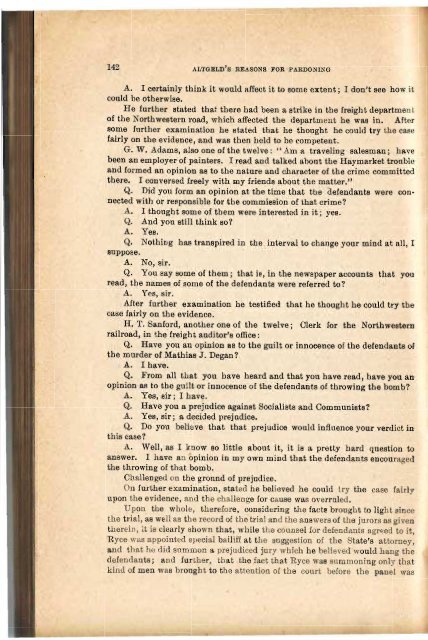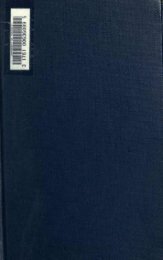The Chicago Martyrs by John P. Altgeld
The Chicago Martyrs by John P. Altgeld
The Chicago Martyrs by John P. Altgeld
Create successful ePaper yourself
Turn your PDF publications into a flip-book with our unique Google optimized e-Paper software.
142<br />
ALTGELD'S REASONS FOR PARDONING<br />
FIELDEN, NEEBE AND SCHWAB.<br />
143<br />
A. I certainly think it would affect it to some extent; I don't see how it<br />
could be otherwise.<br />
He further stated that there had been a strike in the freight department<br />
of the Northwestern road, which affected the department he was in. After<br />
some further examination he stated that he thought he could try the case<br />
fairly on the evidence, and was then held to be competent.<br />
G. W. Adams, also one of the twelve: "Am a traveling salesman; have<br />
been an employer of painters. I read and talked about the Haymarket trouble<br />
and formed an opinion as to the nature and character of the crime committed<br />
there. I conversed freely with my friends about the matter."<br />
Q. Did you form an opinion at the time that the defendants were connected<br />
with or responsible for the commission of that crime?<br />
A. I thought some of them were interested in it; yes.<br />
Q. And you still think so?<br />
A. Yes.<br />
Q. Nothing has transpired in the interval to change your mind at all, I<br />
suppose.<br />
A. No, sir.<br />
Q. You say some of them; that is, in the newspaper accounts that you<br />
read, the names of some of the defendants were referred to?<br />
A. Yes, sir.<br />
After further examination he testified that he thought he could try the<br />
case fairly on the evidence.<br />
H. T. Sanford, another one of the twelve; Clerk for the Northwestern<br />
railroad, in the' freight auditor's office:<br />
Q. Have you an opinion as to the guilt or innocence of the defendants of<br />
the murder of Mathias J. Degan?<br />
A. I have.<br />
Q. From all that you have heard and that you have read, have you an<br />
opinion as to the guilt or innocence of the defendants of throwing the bomb?<br />
A. Yes, sir; I havlil. .<br />
Q. Have you a prejudice against Socialists and Communists?<br />
A. Yes, sir; a decided prejudice.<br />
Q. Do you believe that that prejudice would influence your verdict in<br />
this case?<br />
A. Well, as I know so little about it, it is a pretty hard question to<br />
answer. I have an bpinion in my own mind that the defendants encouraged<br />
the throwing of that bomb.<br />
Challenged on the ground of prejudice.<br />
On further examination, stated he believed he could try the case fairly<br />
upon the evidence, and the challenge for cause was overruled.<br />
Upon the whole, therefore, considering the fact~ brought to light since<br />
the trial, as well as the record of the trial and the answers of the jurors as given<br />
therein, it is clearly shown that, while the counsel for defendants agreed to it,<br />
Ryce was appointed special bailiff at the suggestion of the State's attorney,<br />
and that he did summon a prejudiced jury which he believed would hang the<br />
defendants; and further, that the fact that Ryce was summoning only that<br />
kind of men was brought to the attention of the court before the panel was<br />
RECENT DECISION OF THE SUPREME COURT AS TO COM<br />
PETENCY OF JURORS.<br />
II.<br />
<strong>The</strong> second point argued seems to me to be equally conclusive. In the<br />
case of the People vs. Coughlin, known as the Cronin case, recently decided,<br />
the Supreme'Court, in a remarkably able and comprehensive review of the<br />
law on this subject, says, among other things:<br />
"<strong>The</strong> holdings of this and other courts is substantially uniform, that<br />
where it is once clearly shown that there exists in the mind of the jUl'Or, at<br />
the time he is called to the jury box, a fixed and positive opinion as to the<br />
merits of the case, or as to the guilt or innocence of the defendant he is called<br />
to try, his statement that, notwithstanding such opinion, he can render a fair<br />
and impartial verdict according to the law and evidence, has little, if any,<br />
tendency to establish his impartiality. This is so because the juror who has<br />
sworn to have in bis mind a fixed and positive opinion as to the guilt or innocence<br />
of tbe accused, is not impartial, as a matter of fact. * * *<br />
"It is difficult to see bow, after a juror has avowed a fixed and settled<br />
opinion as to the prisoner's guilt., a court can be legally satisfied of the truth<br />
of his answer that he can render a fair and impartial verdict, or find therefrom<br />
that he bas the qualification of impartiality, as required <strong>by</strong> the constitution.<br />
* * *<br />
"Under such circumstances, it is idle to inquire of the jurors whether they<br />
can return just !l.nd impartial verdicts. <strong>The</strong> more clear and positive were<br />
their impressions of guilt, the more certain they may be that they can act<br />
impartially in condemning the guilty party. <strong>The</strong>y go into the box in a state<br />
of mind that is well calculated to give a color of guilt to all evidence, and if<br />
the accused escapes conviction, it will not be because the evidence has not<br />
established guilt beyond a reasonable doubt, but because an accused party<br />
condemned in advance, and called upon to exculpate himself before a prejudiced<br />
tribunal, has succeeded in doing so. * * *,<br />
"To try a cause <strong>by</strong> such a jury is to authorize men, who state that they<br />
will lean in their finding against one of the parties, unjustly to determine the<br />
rifl;hta of others, and it will be no difficult task to predict, even before the evifull,<br />
and it was asked to stop it, but refused to pay any attention to the matter,<br />
but permitted Ryce to go on, and then forced the defendants to go to trial<br />
before this jury.<br />
While no collusion is proven between the judge and the State's attorney,<br />
J it is clearly shown that after the verdict and while a motion for a new trial<br />
was pending, a charge was filed in court that Ryce had packed the jury, and<br />
that the attorney for the State !!;ot Mr. Favor to refuse to make an affidavit<br />
bearing on this point, which the defendants could use, and then the court<br />
refused to take any notice of it unless the affidavit was obtained, although it<br />
was informed that Mr. Favor would not make an affidavit, but stood ready to<br />
come into court and make a full statement if the court desired him to do so.<br />
<strong>The</strong>se facts alone would call for executive interference, especially as Mr.<br />
Favor's affidavit was not before the Supreme Court at the time it considered<br />
the case.
















